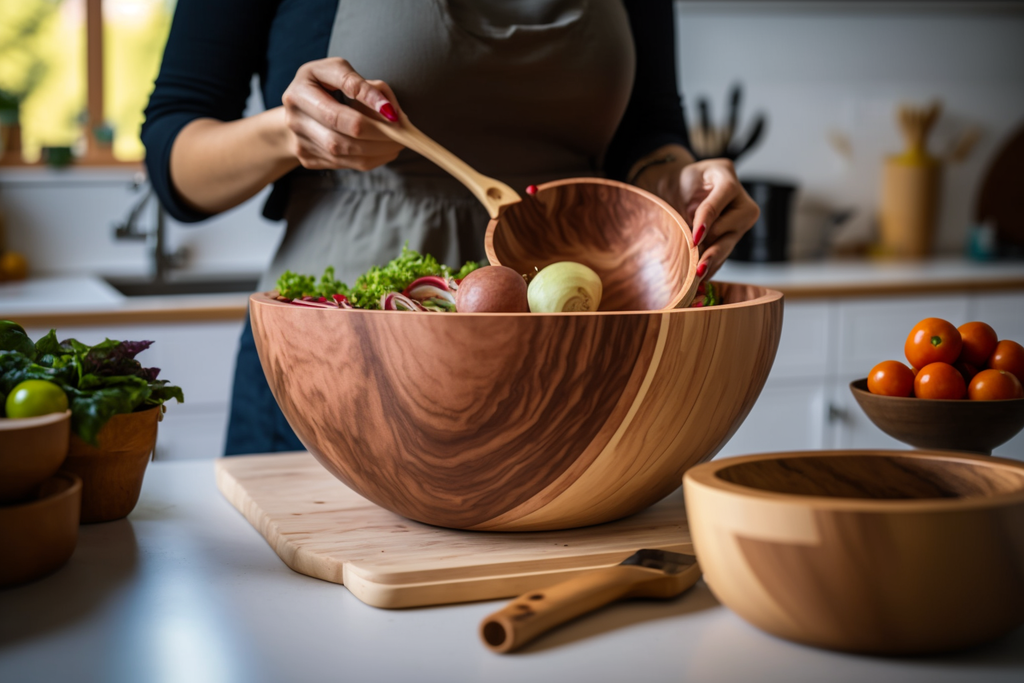Wooden bowls are a beautiful and natural addition to any kitchen.
However, unlike other types of bowls, they require special care and attention to keep them looking their best. In this article, we will explore the best ways to clean and care for your wooden bowls.
What Items Shouldn't be Thrown in the Trash?
Many items should not be thrown in the trash, as they can be harmful to the environment or cause safety hazards.
These include batteries, electronics, hazardous materials, and medical waste.
How to Trash a Trash Can?
To throw out a trash can, simply lift it and place it in the garbage truck.

Can You Put a Wooden Bowl in the Dishwasher?
First, let's address the question "Can you put a wooden bowl in the dishwasher?" The answer is no. Wooden bowls should never be placed in a dishwasher as the heat, and the detergent can cause the wood to warp, crack, and dry out. Wooden bowls should always be washed by hand.
How to Clean a Wooden Bowl?
To clean a wooden bowl, you should use warm water and mild dish soap which can be used to tackle any food residue or stains. Avoid using harsh chemicals or abrasive scrubbers on wooden bowls as these can damage the wood. For heavy-duty stains, you can mix equal parts of vinegar and water and soak for 20 minutes. Then, gently scrub it with a non-abrasive sponge.
For wooden dough bowls or wooden fruit bowls, you should try to clean them quickly, to avoid the food from sticking to the wood thus making them difficult to clean. Old wooden bowls that have not been cleaned in a while can have residual grease and grime, so you might want to use a solution of baking soda and water to clean it.
Teak wood bowls, like other wooden bowls, should also be washed by hand. Teak wood is a durable wood, but it can be damaged by heat, humidity, and chemicals from a dishwasher.
After cleaning, you should thoroughly dry your wooden bowl immediately by wiping it with an absorbent cloth.
It is also important to sanitize and sterilize your wooden bowls to prevent the growth of bacteria. To sanitize, wash with soap and water, and wipe the bowl with a cloth soaked in white vinegar afterward. To sterilize the wooden bowl you can use a solution of 1 part bleach to 10 parts water and soak for up to 2 minutes then rinse.
In terms of maintenance, wooden bowls should be periodically oiled with food-grade oil. This will help to keep the wood hydrated and prevent it from drying out and cracking. Also, wooden bowls should be stored in a dry place.
Finally, wooden bowls can last for many years if properly cared for. Antique wooden bowls are a good example of this as some are said to be over 100 years old. The key is to regularly clean and maintain your wooden bowls, and they will surely stand the test of time.
Summary
In conclusion, wooden bowls are a practical and beautiful addition to any kitchen, but they require special care and attention to keep them in good condition. Following the tips outlined in this article will help you to properly clean, sanitize, and maintain your wooden bowl, preserving its natural beauty for many years to come.
FAQ
Can I use harsh chemicals on wooden bowls?
It is better not to use harsh c

hemicals on wooden bowls, as they can damage the wood.
How often should I oil my wooden bowl?
Wooden bowls should be periodically oiled with food-grade oil; when the wood starts to feel dry or rough it's time for oiling.
How long do wooden bowls last?
Wooden bowls can last for many years, even decades when properly cared for.
Can I use baking soda to clean my wooden bowl?
Yes, you can use a solution of baking soda and water to clean a wooden bowl, it's good for heavy-duty stains.
Where do we make wooden bowls now?
Wooden bowls are made all over the world, each region has its characteristics, techniques, and preferred wood types which makes it so special.
ABOUT THE AUTHOR
Aleksandra Djurdjevic
Senior Content Creator
Aleksandra Djurdjevic is a senior writer and editor, covering jewelry, accessories, and trends. She’s also works with services, home décor. She has previously worked as ESL teacher for English Tochka. Aleksandra graduated from the Comparative Literature department at the Faculty of Philosophy in Serbia. Aleksandra’s love for the environment, crafts and natural products over the years helps her continue to be a top expert at Wooden Earth.






